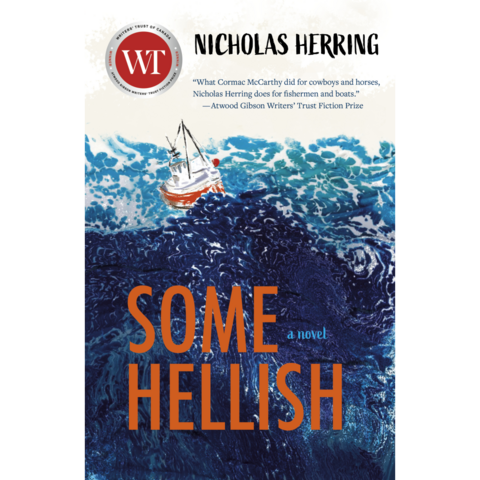
In Nicholas Herring’s first novel, his self-named protagonist, Herring, makes the following socioeconomic comment about lobsters: “You know, it wasn’t too long ago, you couldn’t get anybody to buy lobster. People used it as fertilizer in their gardens. Farmers would put it out on their rows. Eighty per cent of the market nowadays is cruise ships and casinos. The way I see it, lobster is just something people eat to distract them from the fact that they’re pissing their wages away” (260). Some Hellish immerses readers in the lives of those working-class fishers on Prince Edward Island who painstakingly repair their lobster traps and tirelessly navigate choppy seas to gather these creatures that are now considered an expensive delicacy. While the narrative traces Herring’s various trials with his wife, Euna, his daughters, Marcelina and Marceline, and Gerry, with whom he fishes, the novel is in fact a tapestry of portraits of the people working in and adjacent to the fishing industry. Giving snapshots of the folks Herring and Gerry interact with in their everyday activities — each exhibiting their own humorous particularities and familial history — the book cultivates a rich sense of the trade and the web of relations that shape the place. Written with compassion and grit, Nicholas Herring shows how beautiful, treacherous, and often deadly that place (and its surrounding waters) can be.
The book exhibits many elements of the picaresque novel — a realist genre that centres on a “roguish” hero — such as the crass comedy and loosely connected events instead of a steadfast plot. Herring the fisherman also makes for a kind of picaro protagonist: he is low-status and made to feel the consequences of his many blunders. Despite this, there is a seriousness to his work life and his capabilities in the world of lobster fishing that incite admiration. His daughters, for example, are impressed by his expertise when they ask him questions:
When Marceline asks Herring whether he’s a good fisherman, he says “I’m none too bad. . . . But mostly I’m a dummy, too” (279). His answer perfectly exemplifies Herring’s essential dual nature as both quite competent and a blundering fool.
Similarly, while much of the novel’s humour is related to the body — for example, Herring washes Gerry’s pants in the bathtub, but Gerry realizes he has left his set of false teeth in the pocket, so Herring must find and pry each tooth individually out of the bathtub drain — the book’s many scarred bodies in pain also highlight human vulnerability and the risks of the characters’ difficult environment. The body is always present, materially inescapable: Gerry and his mother “ate in silence, their jaws clicking, the pump of their throats” (24); Gerry’s “lips had burst open with cold sores during the night, and the cream he’d put on them hadn’t done anything more than render them as cracked and rigid as larvae paled by the frost” (37); a chip wagon owner in Morell “lost his thumb [and] got his toe stitched on” (56). In the book’s climax, Herring miraculously survives a shipwreck after being lost and alone in the ocean for eight days, but his “skin, both stretched and taut as cheesecloth drawn over a jug and as distended and rotten as a parsnip uncovered in winter, bore the stigma of sharks” (206-07). For many of the characters, pain is a constant and death is close at hand.
The novel’s prose shines in moments of reflection. Herring (the character) often indulges in poetic contemplations that counterbalance his boorish outward behaviour: while watching concrete pouring into trays, “Herring thought of all the walls in the world holding people in. And then, of course, he thought of all the walls in the world holding people out. He tried to picture them and connect them all together in his mind” (73). Later, while serving up lobster to a guest at his home, he says to her, “I wonder who the first person to eat lobster was? Like, how did that go down, exactly? Did a lobster wash up and someone thought, well, heck, I spose I could try eating that thing? How’d they ever get at the meat? . . . Lobster sammies are the best with fog. . . . [Y]ou know, it’s bread that mostly white and kinda not really anything. It’s not really there” (259-60). It is apparent that Herring’s involvement with lobster runs deep — he has thought about these gustatory and philosophical questions at length. The richly textured descriptions by Herring (the writer) give the narrative a fullness and complexity, whether he is telling about Euna’s bar of soap, which “was so precisely hollowed out on either side that it appeared . . . like a dog’s bone you’d see in a cartoon” (13), or the ocean, with “its swirl, its boundless drift, the peaceful risings and fallings that lived without record” (211).
While it is difficult to fault Nicholas Herring’s prose style at the sentence level, some passages in the novel seem unnecessarily extended, which disrupts the flow and pacing of events. For example, when Herring and Gerry meet Johnnie Meaney — “a Newfoundlander by birth, a real meat-and-potatoes kind of fellow” (42) — to load their boat onto a trailer, lengthy accounts of small details bog down the reader and the text loses momentum. This happens again when Herring and Euna avoid talking about the hole Herring has cut in the floor of their house so that he doesn’t have to take the stairs down to the basement. “My great-grandfather built that floor,” she eventually says (34), and the weight of Herring’s actions hit home with this one line of dialogue. But there is quite a lot of meandering prose before Euna confronts him, a delay that lessens the impact of her words. Still, this book is a worthwhile and compelling read. Nicholas Herring draws his characters and island life with specificity, nuance, and tenderness. While the plot does not follow a single linear path, readers can expect a winding, raucous ride through the storied lives of Some Hellish’s crew.











